(打印)新概念英语第二册语法精粹及练习
新概念英语第二册笔记(精美打印版)
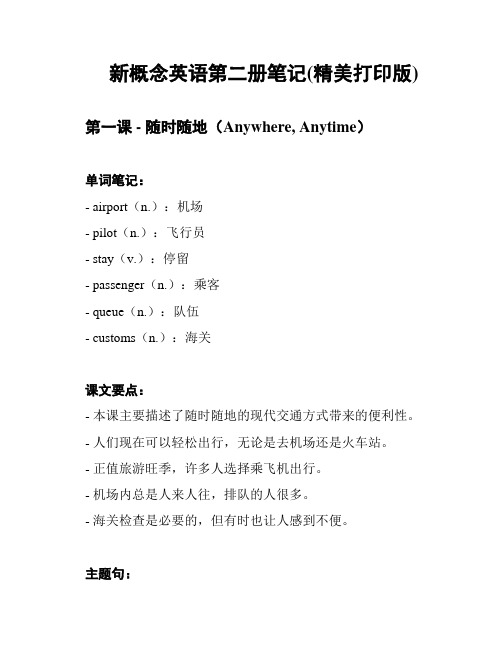
新概念英语第二册笔记(精美打印版)第一课 - 随时随地(Anywhere, Anytime)单词笔记:- airport(n.):机场- pilot(n.):飞行员- stay(v.):停留- passenger(n.):乘客- queue(n.):队伍- customs(n.):海关课文要点:- 本课主要描述了随时随地的现代交通方式带来的便利性。
- 人们现在可以轻松出行,无论是去机场还是火车站。
- 正值旅游旺季,许多人选择乘飞机出行。
- 机场内总是人来人往,排队的人很多。
- 海关检查是必要的,但有时也让人感到不便。
主题句:现代交通方式的进步使我们能够随时随地旅行。
语法重点:- 本课中出现了一些现在进行时的句子,如:People are going to airports and railway stations.(人们正前往机场和火车站。
)- 该课还涉及到一些定冠词的用法,如:I like the customs officer.(我喜欢海关工作人员。
)- 其他值得注意的语法点包括人称代词的宾格形式、形容词比较级等。
第二课 - 奇怪的事(Something Strange)单词笔记:- strange(adj.):奇怪的- fly(v.):飞- cloud(n.):云- monster(n.):怪物- little(adj.):小的- eat(v.):吃- bird(n.):鸟课文要点:- 本课主要讲述了一个小男孩和他的奇怪经历。
- 有一天,男孩看到了一只怪物,它是一个身穿红色衣服、长着绿色头发和眼睛的生物。
- 怪物告诉男孩,他不会飞,但是他能飞到云中间。
- 然后,怪物吃了一些小鸟。
- 最后,怪物告诉男孩他会在树上等待,然后就飞走了。
主题句:男孩看到了一个奇怪的怪物,并与它进行了交谈。
语法重点:- 这篇课文中包含了一些过去式的动词,如:He ate five small birds.(他吃了五只小鸟。
新概念英语第二册语法精粹.doc
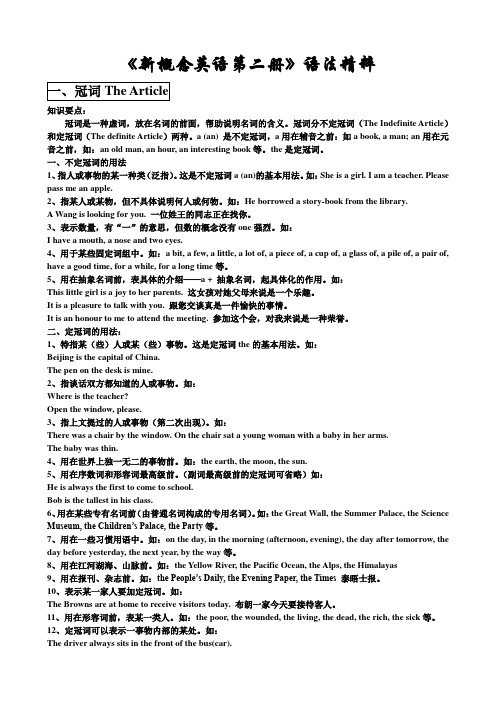
《新概念英语第二册》语法精粹知识要点:冠词是一种虚词,放在名词的前面,帮助说明名词的含义。
冠词分不定冠词(The Indefinite Article)和定冠词(The definite Article)两种。
a (an) 是不定冠词,a用在辅音之前:如a book, a man; an用在元音之前,如:an old man, an hour, an interesting book等。
the是定冠词。
一、不定冠词的用法1、指人或事物的某一种类(泛指)。
这是不定冠词a (an)的基本用法。
如:She is a girl. I am a teacher. Please pass me an apple.2、指某人或某物,但不具体说明何人或何物。
如:He borrowed a story-book from the library.A Wang is looking for you. 一位姓王的同志正在找你。
3、表示数量,有“一”的意思,但数的概念没有one强烈。
如:I have a mouth, a nose and two eyes.4、用于某些固定词组中。
如:a bit, a few, a little, a lot of, a piece of, a cup of, a glass of, a pile of, a pair of, have a good time, for a while, for a long time等。
5、用在抽象名词前,表具体的介绍——a + 抽象名词,起具体化的作用。
如:This little girl is a joy to her parents. 这女孩对她父母来说是一个乐趣。
It is a pleasure to talk with you. 跟您交谈真是一件愉快的事情。
It is an honour to me to attend the meeting. 参加这个会,对我来说是一种荣誉。
《新概念英语》第二册语法精粹-打印版

词名数可不�1 词名通普、2 � 。 词冠定加要,词名有专的成构词名通普由� 。等 setatS detinU eht ,anihC fo cilbupeR s’elpoeP eht ,reviR wolleY eht ,llaW taerG eht �2 �词冠加不�kcaJ ,moT ,nodnoL ,g nijieB ,napaJ ,anihC�1 �词名有专、1 �类种的词名、一 � 点 要 识知
。 语短 定固是.bs htiw drow a evah�词名数可不是 noitamrofni。题考高年 59 是题此 A、02 。 指 泛 , 所场 共公,secalp cilbup ,空二第。指特是固,语定有后空一第。题考高年 39 是题此 C、91 。词冠加不,语短定固是 deb ni。题考高年 29 是题此 D、81 。指特是应明发�题考高年 19 是题此 C、71 。数可不 ecaps�词冠定加应前 srats�题考高年 09 是题此 A、61 。词 名数可不是 cisum�词冠定加前器乐�题考高年 98 是题此 C、51 指泛 A、 4 1 。语短定固,饭吃在正 rennid ta 空一第 C、31 。好不绪情,语短定固是 空二第� 。指特是不此因,人个这识认 不都俩 们我,明 说里号 括� 。访来候 时的在 不您在 生先斯琼 位一有 指是空一第 D、21 。数可不 edart,空二第�绍介的体具表词名数可不 + a,空一第 A、11 C、 0 1 。语定有,指特空二第�词冠加不前目科,空一第 C、9 。词名数可不是 ecneics,空三第,指泛空二、一第 A、8 。词冠定加前词名的一唯的上界世及级高最词容形、脉山 B、7 。语短定固是 loohcs ot og A、6 。指泛。题考高年 58 为题此 A、5 。词名数可不是 rehtaew B、4 。na 用前音元 D、3 。 ”�“量数表且 ,指泛是仍空二第�现出次一第,指泛是空一第,意句据根。题考高年 79 为题此 D、2 。词名数可不是 ria B、1 � 】案 答【 a ;na�D emos ;em os�Cemos ;na�Ba ;em os�A .lufpleh eb thgim eH .reganam eht htiw drowevah dluoc uoy ,lleW—— .esaelp ,letoh ruoy fo tnem eganam eht tuoba noitam rofniekil d’I——、02 eht ;×�D× ;eht�C×;×�Beht ;eht�A .secalp cilbupni sgniht yllis g nitirw fo tibahni llits era elpoep ynaM、91 eht ;×�D× ;eht�Ceht ;eht�B×;×�A .moorhtabni eb ts uj thgim eh tub ,debni llits s’eh kniht I—— ?kcaJ s’erehW——、81 eno�Deht�Ca�B×�A .6781 ni enohpeletdetnevni lleB maharG rednaxelA、71 eht ;eht�D×;×�Ceht ;×�B× ;eht�A .ecapstub gnihton was tuanortsa eht ,sratsdnoyeB、61 eht ;eht�D× ;eht�C×;×�Beht ;×�A .cisumot gninetsil ni detseretni si yrneH elihw onaipgniyalp fo dnof si ecilA、51 na�Da�Ceht�B×�A ?yub ot tnaw uoy od rac fo dnik tahw、41 a ;a�Da;×�C×;×�Beht ;a�A .eno suociledsaw tI .neht rennidta erew yehT、31 a ;A �Deht ;ehT �C ×;A �Ba; × �A.repmet dab ni s aw eH .)nam siht swonk su fo rehtien( tuo erew uoy elihw dellac senoJ rM__、21 eht ;×�Deht ;eht�Cna ;eht�B×;a�A .yadot edart lanoitanretnini tsum a si hsilg nE fo egdelwonk__ taht eerga elpoep ynaM、11 a ;eht ;A�Deht ;eht ;ehT�C×;×;ehT�Ba ;na ;A�A .tsewni stes dna tsaeni sesir nus、01 a ;A�Deht ;×�C× ;×�B× ;ehT�A .ygrene dna rettam fo ecneicssi scisyhP、9 a ;eht ;a�D× ;eht ;×�Ceht ;× ;eht�B× ;a ;a�A
新概念英语第二册语法解析及练习题分享
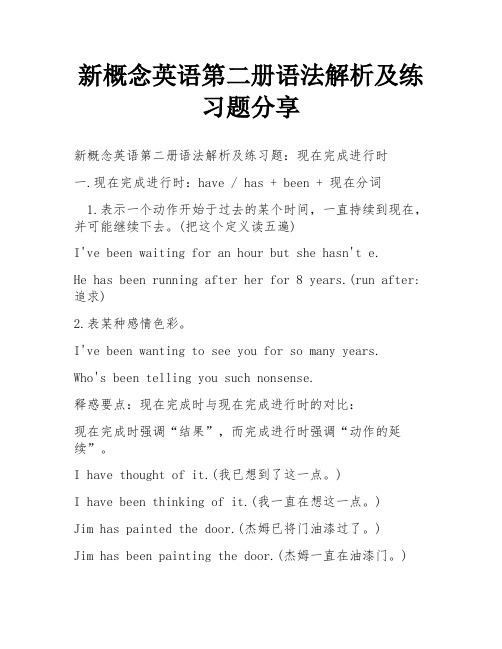
新概念英语第二册语法解析及练习题分享新概念英语第二册语法解析及练习题:现在完成进行时一.现在完成进行时:have / has + been + 现在分词1.表示一个动作开始于过去的某个时间,一直持续到现在,并可能继续下去。
(把这个定义读五遍)I've been waiting for an hour but she hasn't e.He has been running after her for 8 years.(run after: 追求)2.表某种感情色彩。
I've been wanting to see you for so many years.Who's been telling you such nonsense.释惑要点:现在完成时与现在完成进行时的对比:现在完成时强调“结果”,而完成进行时强调“动作的延续”。
I have thought of it.(我已想到了这一点。
)I have been thinking of it.(我一直在想这一点。
)Jim has painted the door.(杰姆已将门油漆过了。
)Jim has been painting the door.(杰姆一直在油漆门。
)练习:1. They ________ us since five o'clock this morning.A. are helpingB. have been helpingC. have been helpedD. have helped2. I ________ the book the whole day, yet I haven't finished it.A. have been readingB. have readC. am readingD. had been reading3. Please e in. We ________ about your paper.A. talkB. had been talkingC. have been talkingD. would have talked4. Such natural resources as coal and petroleum________.A. gradually are exhaustedB. are being gradually exhaustedC. have gradually exhaustingD. have been exhausting gradually5. It ________ almost every day so far this month.A. is rainingB. rainedC. rainsD. has been raining用所给动词正确时态填空。
《新概念英语》第二册语法精粹含答案

《新概念英语》第二册语法精粹(含答案)一、冠词The Article【专项训练】:1、We can’t live without air.A.an B.×C.the D.some 2、——Have you seen pen? I left it here this morning.——Is it black one? I think I saw it somewhere.A.a; the B.the; the C.the; a D.a; a3、I’ve been waiting for him for hour and half. A.×; ×B.the; a C.a; the D.an; a4、What fine weather we have today!A.a B.×C.some D.an5、Have you ever seen as tall as this one?A.a tree B.such tree C.an tree D.tree 6、Children usually go to school at age of six. A.×; the B.a; an C.the; ×D.the; the 7、Himalayas is highest mountain in world. A.×; the;×B.The; the; the C.A; a; a D.×;×;×8、They each have __book. Li Hua’s is about writer. Wang Lin’s is on science.A.a; a; ×B.the; ×; the C.×; the; ×D.a; the; a9、Physics is science of matter and energy. A.The; ×B.×; ×C.×; the D.A; a 10、sun rises in east and sets in west. A.A; an; a B.The;×;× C.The; the; the D.A; the; a11、Many people agree that__knowledge of English is a must in international trade today.A.a;×B.the; an C.the; the D.×; the 12、__Mr Jones called while you were out (neither of us knows this man). He was in badtemper. A.×;a B.A;×C.The; the D.A; a13、They were at dinner then. It was delicous one.A.a; the B.×;×C.×;a D.a; a14、what kind of car do you want to buy?A.×B.the C.a D.an15、Alice is fond of playing piano while Henry is interested in listening to music.A.×; the B.×;×C.the; ×D.the; the16、Beyond stars, the astronaut saw nothing butspace.A.the; ×B.×; the C.×;×D.the; the 17、Alexander Graham Bell invented telephone in 1876.A.×B.a C.the D.one 18、——Where’s Jack?——I think he’s still in bed, but he might just be in bathroom.A.×;×B.the; the C.the; ×D.×; the 19、Many people are still in habit of writing silly things in public places.A.the; the B.×;×C.the; ×D.×; the 20、——I’d like information about the management of your hotel, please.——Well, you could have word with the manager. He might be helpful.A.some; a B.an; some C.some; some D.an; a【答案】:1、B air是不可数名词。
新概念英语第二册语法解析及练习题

新概念英语第二册语法解析及练习题•相关推荐新概念英语第二册语法解析及练习题新概念英语第二册语法解析及练习题1过去完成时:had +过去分词1.表示过去某个动作或某个具体时间之前已经发生、完成的动作。
“过去的过去”。
● They had got everything ready before I came.● The play had begunbefore I got to the theater with my boyfriend.2.过去完成时常用于hardly / scarcely ... when, no sooner ... than等固定句型结构中。
(此乃超级重点句型,意为:“一……就”)● She had hardly / scarcely gone to bed when the bell rang.● No sooner had he arrived at the railway station than he met her parents.(注意no sooner在句首时句型倒装。
)3.intend(打算),mean(意味),hope(希望),want(想要),plan(计划)等动词的'过去完成时用来表示本打算做而没有做的事。
● I had intended to call on you yesterday, but someone came to see me just when I was about to leave.(……原想昨天去看你……)● They had planed to hold a football mat ch last week, but they had to cancel it because the bad weather.(……原计划上周举行一场足球赛……)练习:1. -Let's hurry! The president is coming. -Oh, I was afraid that we ________.A. already miss himB. had already missed himC. will miss him alreadyD. have already missed him2. Your letter came just as I ________ my office.A. was leavingB. would leaveC. had leftD. left3. I ________ my keys, I can't remember where I last sawthem.A. was losingB. lostC. had lostD. have lost4. Nobody knew where the teacher ________.A. has goneB. would have goneC. had goneD. would be gone5. The sportsmen ________ training for 3 hours when the coach told them to break off for rest.A. have beenB. areC. had beenD. were答案:1. B2. A3. D4. C5. C新概念英语第二册语法解析及练习题2过去将来进行时:should / would be +现在分词表示从过去某时看将来某时正在进行的动作。
高一英语《新概念英语第二册》语法精粹(含习题) 名词性从句

《新概念英语第二册》语法精粹知识要点:1、熟悉并掌握各个连接词、关系代词和连接副词的用法。
2、熟悉并掌握复合句即名词性从句〔主语从句、宾语从句、表语从句、同位语从句〕,定语从句和状语从句。
什么叫复合句:由一个主句和一个或一个以上的从句构成的句子叫复合句。
在复合句中主句是全句的主体,从句是全句的一个成分,不能独立。
从句通常是用关联词来引导的。
在这里关联词还起联系从句和主句的作用。
主从复合句〔Complex Sentences〕一、从句的种类:注:以it作形式主语,把主语从句后置的常用的句型有:〔1〕It + be + 形容词 + that从句〔2〕It + be + 名词词组 + that从句〔3〕It + be + 过去分词 + that从句〔4〕It seem, happen等不与物动词 + that从句二、常用的关联词1、主语从句:2、宾语从句:3、表语从句:4、同位语从句:名词性从句包括四种从句即主语从句、表词从句、宾语从句和同位词从句。
名词性从句的特点:that 、who、 whom、 what 、whether与 when、 where引导名词性从句时必须是陈述句词序:1、主词从句:That light travels in straight line is known to all .(That 引导主语从句不可省) When t he plan is to take off hasn’t been announced .主语从句通常以it 做形主语出现It was my fault that I had him play foatball all faternoon.It is important that we should go to the school to talk with the teacher.2、表语从句,即名词性从句放在表语位置就是表语从句,需要注意的,主语是 reason时,表语要用that引导而不是because.The reason why he was late was that he missed the train by one minute this morning .3、宾语从句that 常可以省略,并且注意时态呼应,当主句为过去时时,从句时态一定往前推移,不可出现现在时或现在完成时。
新概念英语第二册语法精粹及练习
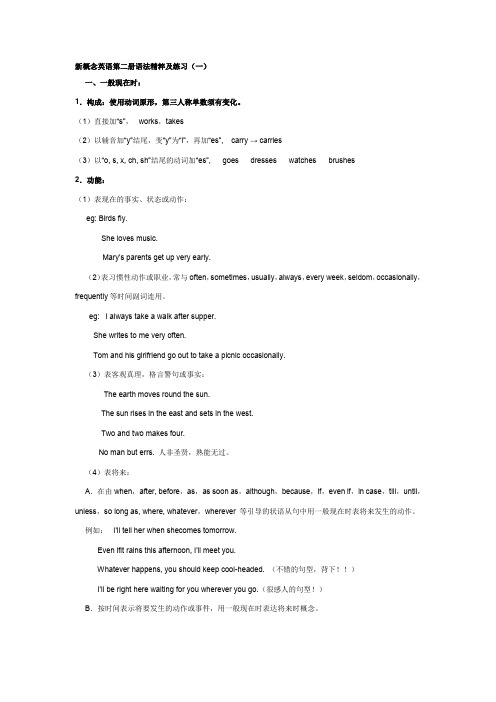
新概念英语第二册语法精粹及练习(一)一、一般现在时:1.构成:使用动词原形,第三人称单数须有变化。
(1)直接加“s”,works,takes(2)以辅音加“y”结尾,变“y”为“i”,再加“es”,carry → carries(3)以“o, s, x, ch, sh”结尾的动词加“es”, goes dresses watches brushes2.功能:(1)表现在的事实、状态或动作:eg: Birds fly.She loves music.Mary's parents get up very early.(2)表习惯性动作或职业,常与often,sometimes,usually,always,every week,seldom,occasionally,frequently等时间副词连用。
eg: I always take a walk after supper.She writes to me very often.Tom and his girlfriend go out to take a picnic occasionally.(3)表客观真理,格言警句或事实:The earth moves round the sun.The sun rises in the east and sets in the west.Two and two makes four.No man but errs. 人非圣贤,熟能无过。
(4)表将来:A.在由when,after, before,as,as soon as,although,because,if,even if,in case,till,until,unless,so long as, where, whatever,wherever 等引导的状语从句中用一般现在时表将来发生的动作。
例如:I'll tell her when shecomes tomorrow.Even ifit rains this afternoon, I'll meet you.Whatever happens, you should keep cool-headed. (不错的句型,背下!!)I'll be right here waiting for you wherever you go.(很感人的句型!)B.按时间表示将要发生的动作或事件,用一般现在时表达将来时概念。
2011-学习资料大全:新概念英语第二册语法精粹及练习

天才是百分之九十九的勤奋加百分之一的灵感新概念英语第二册语法精粹及练习(一)新概念二册语法精粹一、一般现在时一、一般现在时:1.构成:使用动词原形,第三人称单数须有变化。
(1)直接加“s”,works,takes(2)以辅音加“y”结尾,变“y”为“i”,再加“es”,carry → carries(3)以“o, s, x, ch, sh”结尾的动词加“es”, goes dresses watches brushes2.功能:(1)表现在的事实、状态或动作:eg: Birds fly.She loves music.Mary's parents get up very early.(2)表习惯性动作或职业,常与often,sometimes,usually,always,every week,seldom,occasionally,frequently等时间副词连用。
eg: I always take a walk after supper.She writes to me very often.Tom and his girlfriend go out to take a picnic occasionally.(3)表客观真理,格言警句或事实:The earth moves round the sun.The sun rises in the east and sets in the west.Two and two makes four.No man but errs. 人非圣贤,熟能无过。
(4)表将来:A.在由when,after, before,as,as soon as,although,because,if,even if,in case,till,until,unless,so long as, where, whatever,wherever 等引导的状语从句中用一般现在时表将来发生的动作。
高一英语《新概念英语第二册》语法精粹(含习题) 句子

《新概念英语第二册》语法精粹知识要点:句子按使用的目的可分为四类:1、陈述句2、疑问句3、祈使句4、感叹句从结构上看句子可分为三种类型:1、简单句2、并列句3、复合句一、句子的种类(Kinds of Sentences)1、陈述句:(1)肯定句:We love our motherland. 我们热爱祖国。
(2)否定句:They don’t go to work on Sundays. 他们星期日不上班。
说明:叙述或否定一个事实或看法。
2、疑问句:(1)一般疑问句:Are you a worker? 你是个工人吗?Yes, I am. 是的,我是工人。
Haven’t you seen the film? No, I haven’t. 你没看过这部电影吗?没看过。
说明:以一个助动词,情态动词或动词be开始的问句。
回答要用yes或no。
(2)特殊疑问句:Who is the man? 这人是谁?When do you watch TV? 你什么时间看电视?What are they doing now? 他们现在正在干什么?说明:以一个疑问代词或疑问副词开头的句子一般要用倒装句语序(或称为疑问词加一般疑问句)(3)选择疑问句:Do you want tea or coffee? Either will do. 你要茶水还是要咖啡?哪种都行。
Does he learn Japanese or French? He learns French. 他学日语还是学法语?他学法语。
说明:提出两个或两个以上的情况,选择一个作为答案。
(4)反意疑问句:They are going to the airport, aren’t they? 他们要去机场,是吗?You haven’t finished your homework, have you? 你没做完作业,是吗?说明:提出情况或看法问对方是否同意。
在陈述句后附加一个简短的疑问句,即前面句子肯定,后为否定;前面句子否定,后为肯定。
《新概念英语》第二册语法精粹(讲练及答案)
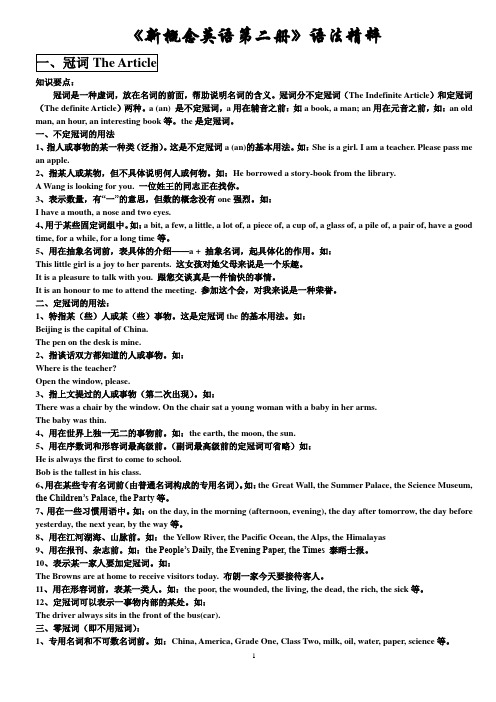
《新概念英语第二册》语法精粹知识要点:冠词是一种虚词,放在名词的前面,帮助说明名词的含义。
冠词分不定冠词(The Indefinite Article)和定冠词(The definite Article)两种。
a (an) 是不定冠词,a用在辅音之前:如a book, a man; an用在元音之前,如:an old man, an hour, an interesting book等。
the是定冠词。
一、不定冠词的用法1、指人或事物的某一种类(泛指)。
这是不定冠词a (an)的基本用法。
如:She is a girl. I am a teacher. Please pass me an apple.2、指某人或某物,但不具体说明何人或何物。
如:He borrowed a story-book from the library.A Wang is looking for you. 一位姓王的同志正在找你。
3、表示数量,有“一”的意思,但数的概念没有one强烈。
如:I have a mouth, a nose and two eyes.4、用于某些固定词组中。
如:a bit, a few, a little, a lot of, a piece of, a cup of, a glass of, a pile of, a pair of, have a good time, for a while, for a long time等。
5、用在抽象名词前,表具体的介绍——a + 抽象名词,起具体化的作用。
如:This little girl is a joy to her parents. 这女孩对她父母来说是一个乐趣。
It is a pleasure to talk with you. 跟您交谈真是一件愉快的事情。
It is an honour to me to attend the meeting. 参加这个会,对我来说是一种荣誉。
《新概念英语第二册》语法精粹(含习题):综合习题-名词性从句(1)

《新概念英语第二册》语法精粹名词性从句【专项训练】:1、It doesn’t matter I rest or not.A.if B.whether C.that D.when2、I can’t understand is he wants to change his mind.A.that, that B.which, what C.what, why D.what, that3、I was free that day.A.It happened to B.It happened thatC.That happened D.It was happened that4、He you are not going abroad.A.surprised that B.is surprised whetherC.is surprised that D.surprised at5、I wonder how much .A.cost the coat B.does the coat costC.the coat costs D.the coat is cost6、I ha ve will b e yours sooner or later.A.No matter what B.WhateverC.Whether D.That7、in the newspaper that the Japanese Minister will arrive in Beijing next Friday.A.It says B.He is said C.It has said D.It is said8、we go swimming every day us a lot of good.A.If, do B.That, do C.If, does D.That, does9、Is this we met them last night.A.where B.place C.place in which D.place which10、We all know the truth there are air, water and sunlight there are living things.A.where B.wherever C.that D.that wherever 11、I think it is you’re eating too much.A.that B.because C.the rea son D.for12、It is said has been tra nslated into French.A.that that B.which C.that D.that which 13、It is still a question we shall have our sports meet.A.why B.that C.when D.which14、It’s not yet clear of those will be chosen to go abroad.A.that B.which C.whom D.who15、These pictures show you .A.What does our village look like B.What our village looks liveC.How does our village look like D.how our village looks like16、Can you make sure the gold necklace?A.where Alice had put B.where did Alice putC.where Alice has put D.where has Alice put17、Go and get your glasses. It’s you left it.A.there B.where C.there where D.where there 18、——Do you remember he came?——Yes, I do. He came by train.A.how B.when C.where D.that19、we can’t get seems better than we have.A.What, what B.What, that C.That, that D.That, what20、Mother asked me .A.what was wrong with me B.what’s wrong with meC.what wrong was with me D.what wro ng is with me21、they have won the game made us excited.A./ B.That C.What D.Where22、I accept the girl or refuse it is none o f your business.A.If B.Whether C.Even if D.When23、he says in his report is a very interesting question.A.What all B.All what C.What D.What that24、When they will start not been decided.A.have B.is C.does D.has25、certain that his invention will lead to the development of production.A.That is B.This is C.It is D.It has26、is unknown to us all.A.Where did she put it B.Where she put itC.That where she put it D.In which she put it27、nothing to do with us.[来源:Z。
新概念英语第二册语法及课后练习:五种基本句型结构
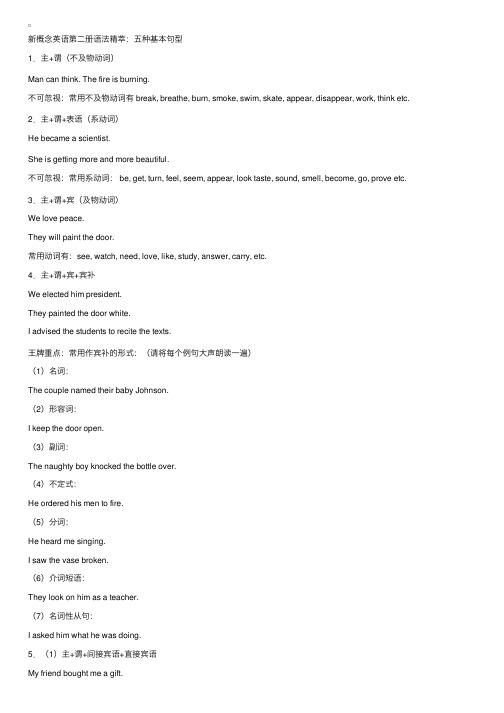
新概念英语第⼆册语法精萃:五种基本句型1.主+谓(不及物动词)Man can think. The fire is burning.不可忽视:常⽤不及物动词有 break, breathe, burn, smoke, swim, skate, appear, disappear, work, think etc. 2.主+谓+表语(系动词)He became a scientist.She is getting more and more beautiful.不可忽视:常⽤系动词: be, get, turn, feel, seem, appear, look taste, sound, smell, become, go, prove etc. 3.主+谓+宾(及物动词)We love peace.They will paint the door.常⽤动词有:see, watch, need, love, like, study, answer, carry, etc.4.主+谓+宾+宾补We elected him president.They painted the door white.I advised the students to recite the texts.王牌重点:常⽤作宾补的形式:(请将每个例句⼤声朗读⼀遍)(1)名词:The couple named their baby Johnson.(2)形容词:I keep the door open.(3)副词:The naughty boy knocked the bottle over.(4)不定式:He ordered his men to fire.(5)分词:He heard me singing.I saw the vase broken.(6)介词短语:They look on him as a teacher.(7)名词性从句:I asked him what he was doing.5.(1)主+谓+间接宾语+直接宾语My friend bought me a gift.I passed him the book.(2)主+谓+直宾+介词+间宾My friend bought a gift for me.I passed the book to him.忘记就意味着背叛→常与介词 for 搭配的动词有:buy, make, do get, play, call, choose, cook, fetch, find, keep order, s ave, etc.常与介词 to 搭配的动词有:bring, give, grant, hand, pass, lend, offer, pay, promise, sell, send, show, each, tell, throw, write, etc.。
《新概念英语第二册》语法精粹(含习题):名词性从句

《新概念英语第二册》语法精粹八、名词性从句知识要点:1、熟悉并掌握各个连接词、关系代词和连接副词的用法。
2、熟悉并掌握复合句即名词性从句(主语从句、宾语从句、表语从句、同位语从句),定语从句和状语从句。
什么叫复合句:由一个主句和一个或一个以上的从句构成的句子叫复合句。
在复合句中主句是全句的主体,从句是全句的一个成分,不能独立。
从句通常是用关联词来引导的。
在这里关联词还起联系从句和主句的作用。
主从复合句(Complex Sentences)一、从句的种类:主语从句(Subject Clauses)1、名词性从句表语从句(Predicative Clauses)NounClauses[来源:Z。
xx。
]宾语从句(Object Claus es)同位语从句(Appositive Clauses)2、定语从句(Attributive Clauses)3、状语从句(Adverbial Clauses)注:以it作形式主语,把主语从句后置的常用的句型有:(1)It + be + 形容词+ that从句(2)It + be + 名词词组+ that从句(3)It + be + 过去分词+ that从句(4)It seem, happen等不及物动词+ that从句二、常用的关联词1、从属连词that(无词义);whether是否;if假如,是否although(though)虽然;because因为when当…时候;before在…前;after在…后since既然,自从;as正如,尽管,一边,由于;while在…期间as soon as一…就;as long as只要;as if好像2、连接代词who, whom, which, what, whose3、连接副词when, where, why, how4、关系代词who, whom, whose, which, that5、关系副词when, where, why1、主语从句:种类关联词例句说明连that That he will come and help you is certain.他来帮助你是确实无疑的。
高一英语《新概念英语第二册》语法精粹(含习题) 综合习题-定语从句1

《新概念英语第二册》语法精粹【专项训练】:一、选择填空:1、It was in that house he used to live the secret meeting was held.A.where;where B.that;that C.what;where D.where;that2、The foreign guests,were scientists, were warmly welcomed at the airport.A.most of them B.most of whom C.most of that D.most of those3、That’s not the book you can find the exact answer.A.which B.that C.when D.where4、The building over there is a library, is a department store.A.where B.west of whichC.to the west of it D.in the west of that5、He was the very one of the students who praised at the class meeting.A.was B.were C.is D.are6、She is the girl.A.whose money was stolen B.the which money was stolenC.whose money was robbed D.the which money was robbed7、This composition is order,makes the teacher.A.in; which; puzzled B.for; that; happyC.out of ; which; angry D.no; it ;disappointed8、There are 104 elements found in nature,are metals.A.most of it B.most of whichC.mostly D.that9、Africa is actually connected with Asia at the spotthe Suez Canal was dug.A.when B.where C.which D.and10、Jack is who knows how to work out the problem.A.one of the boys B.the only one of the boyC.not one of the boys D.the only one of the boys11、China has many islands,Taiwan is the largest.A.in where B.in that C.of that D.of which12、Is this factoryyour friends visited the day before yesterday?A.that B.which C.where D.the one13、We have not had for many weeks.A.such cold day as this B.such cold a day as thisC.such a cold day like this D.such a cold day as this14、The man will never forget the dayshe spent with Lenin.A.when B.on which C.on that D.that15、She is the only one of the studentsgood at Japanese.A.that is B.that are C.which is D.which are16、The balls are solid, makes them very heavy.A.it B.what C.which D.that17、Is this calculator you borrowed from Jane?A.which B.one C.the one D.what18、The scientist and his achievementsyou told me about are admired by us.A.who B.that C.which D. /19、I suppose the theory he stuckcorrect.A.to prove B.to proving C.to proved D.prove 20、He is working hard,will make him pass the final exam.A.who B.that C.which D.it21、The museumwe are going to visit is far form our school.A.where B.that C.it D.as22、It is getting hotter and hotter in Wuhan, is usual.A.and B.it C.as D.that23、We will never forget the dayswe spent happily together in the mountain village.A.when B.which C.where D.on which24、Which of the two sheep you keep produces more milk?A.that B.which C.what D.they25、is known to all, Lu Xun was famousa great thinker.A.Which; for B.As; for C.It; as D.As ; as26、Are these glasses?A.which you wish will be repaired B.the ones you wish to have repaired C.the one you wish to repair D. that you wish to be repaired27、The weather turned out to be very good, was more than we could expect.A.what B.which C.that D.it28、In the dark street, there wasn’t a single personshe could turn for help.A.that B.who C.from whom D.to whom29、She heard a terrible noise, brought her heart into her mouth.A.it B.which C.this D.that30、He paid the boy $10 for washing ten windows, most of hadn’t been cleaned for at least a year.A.these B.those C.that D.which31、Finally, the thief handed everything he had stolen to the police.A.which B.what C.whatever D.that32、The only thing,I am not sure is the idiom.A.for which B.of which C.that D.which33、You must give the wallet backit belongs to.A.to whom B.whom C.to one D.to the person who34、Tom as well as his friends whofootball matchesto school today.A.likes; hasn’t gone B.likes; haven’t goneC.like; hasn’t gone D.like; haven’t gone35、You, whoready to offer him your assistance at any time ,are a true friend of his.A.is B.are C.was D.were36、Such a problemshould be settled first.A.like that is B.as this C.as that this is D.like this is37、Women receive the same payin New China.A.as men B.as that men receive C.as which men did D.as men did38、This is one of the best novels thatthis year.A.had appeared B.is appearing C.has appeared D.have appeared39、My father is a humorous man.A., whom you met last night B.whom you met last nightC.whom you met last night D., whom you met last night40、Alfred Hitchcockproduced a new film called Frenzy.A.who is well-known for thriller movies B., who is well-known for thriller movies,C.whom is well-known for thriller movies D., whom is well known for thriller movies41、I’ll take you to a newly opened marketyou may get all you need.A.which; that B.where; that C.in which; which D.where ;what42、Li Lin is the only one of the students whoto Kunming.A.has gone B.have been C.that is D.had gone43、I, your friend ,will try my best to help you.A.that is B.which am C.who is D.who am44、Do you know anything about the accidentin the street yesterday?A.happened B.happening C.which happened D.which was happened45、I’m interested inyou have told me.A.which B.all that C.all what D.that46、I’ll never forget the daysI was staying with you.A.on which B.which C.that D.when47、The king had never seenhorsesthe man drew.A.such ; as B.so; as C.so; that D.such; which48、I am reading the same bookyou did yesterday.A.like B.as C.for D.since49、The buses,were already full, were surrounded by passengers.A.most of them B.most of which C.which most D.that most50、Have you ever been to Xi’an,I left ten years ago.A.where B.which C.that D.when51、We should learn from those are ready to help others.A.who B.whom C.whose D.they52、I have two brothers,are doctors.A.both of them B.both of who C.both of whom D.both of they53、everybody knows, China has the largest population in the world.A.Which B.That C.As D.The thing54、Everythingcan be done should be done.A.which B.that C.all D.that55、This is the house you saw the other day.A.that B.where C.in which D.in that56、Is oxygen the only gashelps fire burn?A.that B./ C.which D.what57、The first placewe visited in that city was a big factory.A.where B.in which C.that D.which58、Which is the largest bridgewas built across the river?A.that B.which C.where D.on which59、Please pass me the dictionarycover is black.A.which B.its C.whose D.which of60、is natural, she goes abroad with her husband.A.It B.What C.Which D.As61、This is the very placeI’m wishing to live in.A.where B.which C.that D.in which62、I think that was the reasonour football team lost the game.A.that B.which C.how D.why63、The reasonhe didn’t come washe was injured.A.that , because B.why, that C.why, because D.that , that64、He must be from Africa, can be seen form his skinA.that B.as C.it D.what65、Is it in that factory“Red Flag〞 cars are made?A.in which B.where C.that D.which二、改错:1、He told us about the countries where he had visited.2、Egypt is a country where is famous for its pyramids.3、China is the country where he spent the best part of his life.4、The days when we spent together cannot be easily forgotten.5、The house stands at the place that the two roads meet.6、We shall visit the college where his father teaches there.7、I know the reason that she looks so worried.8、He left me the book, that is very useful for me.9、This is the room which food is kept.10、April 15, 1976 is the day when we’ll never forget.11、The man came yesterday is our English teacher.12、I know the student was praised at the meeting last week.13、This is all which I can do for you.14、Can you think of anyone who’s house was here?15、The watch that Mother bought it for me works very well.16、This is the only book that were borrowed from the library.17、The day which she had to leave arrived at last.18、The doctor whom they want to see have come.19、Do you know the young man whom has been chosen chairman?20、The park stands at the place that the two rivers meet.21、A plane is a machine can fly.22、It is one of the best pictures which have been sold.23、Those that want to go put up your hands.24、This is the knife with that the doctor did the operation.25、Who is the man whom you said hello just now?【答案】:一、1、D 2、B 3、D 4、B 5、A 6、A7、C 8、B 9、B 10、D 11、D 12、D13、D 14、D 15、A 16、C 17、C 18、B19、C 20、C 21、B 22、C 23、B 24、A25、D 26、B 27、B 28、D 29、B 30、D31、D 32、B 33、D 34、C 35、B 36、B37、A 38、D 39、A 40、B 41、B 42、A43、D 44、C 45、B 46、D 47、A 48、B49、B 50、B 51、A 52、C 53、C 54、B55、A 56、A 57、C 58、A 59、C 60、D61、C 62、D 63、B 64、B 65、C二、1、where-that 2、where-which 3、where-which4、when—that \ which5、that—where6、去掉there7、that—why 8、that—which 9、which—where10、when—which \ that 11、man后面加who 12、students后面加who13、which—that 14、who’s—whose 15、去掉it16、were—was 17、which—when 18、have—has19、whom—who 20、that—where21、machine后面加which \ that 22、which—that 23、that—who 24、that—which 25、whom—that。
新概念英语第二册语法精粹含答案
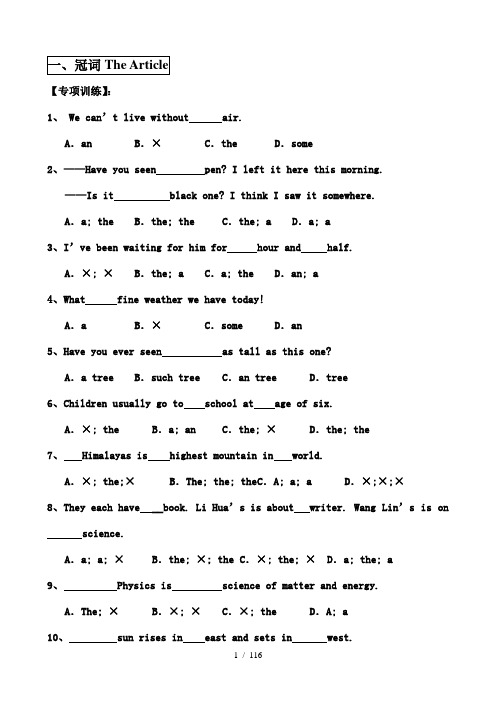
【专项训练】:1、We can’t live without air.A.an B.×C.the D.some2、——Have you seen pen? I left it here this morning.——Is it black one? I think I saw it somewhere.A.a; the B.the; the C.the; a D.a; a3、I’ve been waiting for him for hour and half.A.×; ×B.the; a C.a; the D.an; a4、What fine weather we have today!A.a B.×C.some D.an5、Have you ever seen as tall as this one?A.a tree B.such tree C.an tree D.tree6、Children usually go to school at age of six.A.×; the B.a; an C.the; ×D.the; the7、Himalayas is highest mountain in world.A.×; the;×B.The; the; the C.A; a; a D.×;×;×8、They each have __book. Li Hua’s is about writer. Wang Lin’s is onscience.A.a; a; ×B.the; ×; the C.×; the; ×D.a; the; a9、Physics is science of matter and energy.A.The; ×B.×; ×C.×; the D.A; a10、sun rises in east and sets in west.A.A; an; a B.The;×;× C.The; the; the D.A; the; a11、Many people agree that__knowledge of English is a must ininternational trade today.A.a;×B.the; an C.the; the D.×; the12、__Mr Jones called while you were out (neither of us knows this man).He was in badtemper. A.×;a B.A;×C.The; the D.A; a13、They were at dinner then. It was delicous one.A.a; the B.×;×C.×;a D.a; a14、what kind of car do you want to buy?A.×B.the C.a D.an15、Alice is fond of playing piano while Henry is interested in listening tomusic.A.×; the B.×;×C.the; ×D.the; the16、Beyond stars, the astronaut saw nothing but space.A.the; ×B.×; the C.×;×D.the; the17、Alexander Graham Bell invented telephone in 1876.A.×B.a C.the D.one18、——Where’s Jack?——I think he’s still in bed, but he might just be inbathroom.A.×;×B.the; the C.the; ×D.×; the19、Many people are still in habit of writing silly things in publicplaces.A.the; the B.×;×C.the; ×D.×; the20、——I’d like information about the management of your hotel, please.——Well, you could have word with the manager. He might be helpful.A.some; a B.an; some C.some; some D.an; a【答案】:1、B air是不可数名词。
新概念英语第二册语法精粹含答案修订版
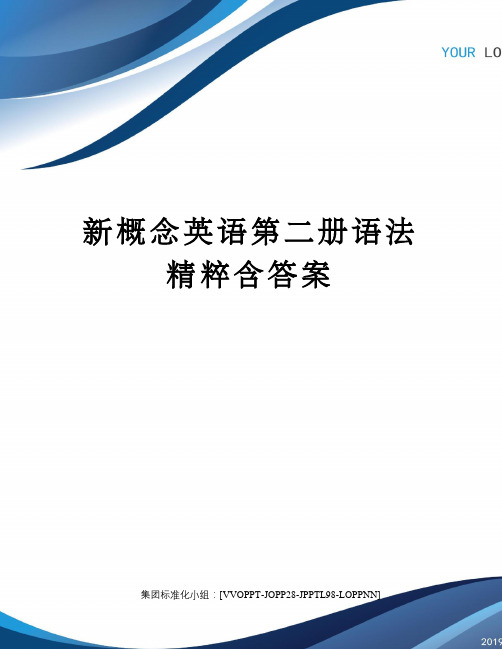
新概念英语第二册语法精粹含答案集团标准化小组:[VVOPPT-JOPP28-JPPTL98-LOPPNN]【专项训练】:1、We can’t live without air.A.an B.×C.the D.some2、——Have you seen penI left it here this morning.——Is it black oneI think I saw it somewhere.A.a; the B.the; the C.the; a D.a; a3、I’ve been waiting for him for hour and half.A.×; ×B.the; a C.a; the D.an; a4、What fine weather we have today!A.a B.×C.some D.an5、Have you ever seen as tall as this one?A.a tree B.such tree C.an tree D.tree6、Children usually go to school at age of six.A.×; the B.a; an C.the; ×D.the; the7、Himalayas is highest mountain in world.A.×; the;×B.The; the; the C.A; a; a D.×;×;×8、They each have __book. Li Hua’s is about writer. Wang Lin’s is onscience.A.a; a; ×B.the; ×; the C.×; the; ×D.a; the; a9、Physics is science of matter and energy.A.The; ×B.×; ×C.×; the D.A; a10、sun rises in east and sets in west.A.A; an; a B.The;×;×C.The; the; the D.A; the; a11、Many people agree that__knowledge of English is a must ininternational trade today.A.a;×B.the; an C.the; the D.×; the 12、__Mr Jones called while you were out (neither of us knows this man). Hewas in badtemper. A.×;a B.A;×C.The; the D.A; a 13、They were at dinner then. It was delicous one.A.a; the B.×;×C.×;a D.a; a14、what kind of car do you want to buy?A.×B.the C.a D.an15、Alice is fond of playing piano while Henry is interested in listening tomusic.A.×; the B.×;×C.the; ×D.the; the16、Beyond stars, the astronaut saw nothing butspace.A.the; ×B.×; the C.×;×D.the; the17、Alexander Graham Bell invented telephone in 1876.A.×B.a C.the D.one 18、——Where’s Jack?——I think he’s still in bed, but he might just be inbathroom.A.×;×B.the; the C.the; ×D.×; the19、Many people are still in habit of writing silly things in public places.A.the; the B.×;×C.the; ×D.×; the 20、——I’d like information about the management of your hotel, please.——Well, you could have word with the manager. He might be helpful.A.some; a B.an; some C.some; some D.an; a【答案】:1、B air是不可数名词。
最全的新概念英语第二册语法汇总
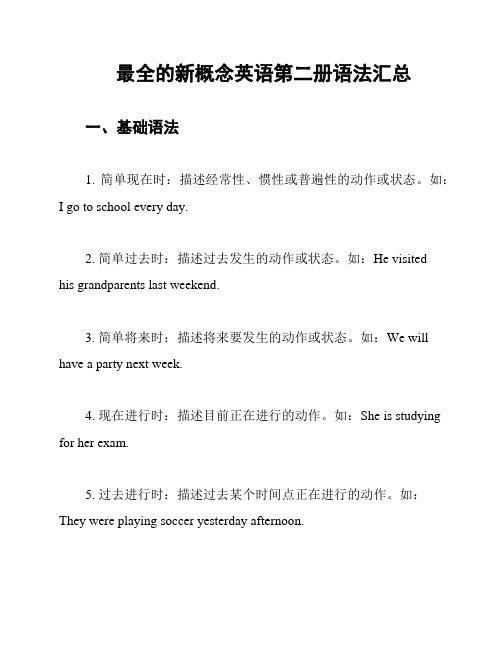
最全的新概念英语第二册语法汇总一、基础语法1. 简单现在时:描述经常性、惯性或普遍性的动作或状态。
如:I go to school every day.2. 简单过去时:描述过去发生的动作或状态。
如:He visitedhis grandparents last weekend.3. 简单将来时:描述将来要发生的动作或状态。
如:We will have a party next week.4. 现在进行时:描述目前正在进行的动作。
如:She is studying for her exam.5. 过去进行时:描述过去某个时间点正在进行的动作。
如:They were playing soccer yesterday afternoon.6. 将来进行时:描述将来某个时间将会进行的动作。
如:I will be working late tonight.二、进阶语法1. 被动语态:表示动作的承受者在句中更重要。
如:The book was written by him.2. 间接引语:重述别人说的话,常常使用动词say、tell等。
如:He said that he was tired.3. 定语从句:用来修饰名词,常以关系代词who、which、that引导。
如:The man who is talking to Mary is my uncle.4. 倒装句:将句子的主语和谓语动词的位置颠倒。
如:Only by working hard can you achieve success.5. 条件句:表示假设、条件或可能性,分为三种类型。
如:If I have time, I will go to the party.6. 反意疑问句:通常由一个肯定句和一个否定短语组成。
如:You like coffee, don't you?三、高级语法2. 主语从句:作为句子的主语,由连词that引导。
- 1、下载文档前请自行甄别文档内容的完整性,平台不提供额外的编辑、内容补充、找答案等附加服务。
- 2、"仅部分预览"的文档,不可在线预览部分如存在完整性等问题,可反馈申请退款(可完整预览的文档不适用该条件!)。
- 3、如文档侵犯您的权益,请联系客服反馈,我们会尽快为您处理(人工客服工作时间:9:00-18:30)。
新概念英语第二册语法精粹及练习(一)新概念二册语法精粹一、一般现在时一、一般现在时:1.构成:使用动词原形,第三人称单数须有变化。
(1)直接加“s”,works,takes(2)以辅音加“y”结尾,变“y”为“i”,再加“es”,carry → carries(3)以“o, s, x, ch, sh”结尾的动词加“es”, goes dresses watches brushes2.功能:(1)表现在的事实、状态或动作:eg: Birds fly.She loves music.Mary's parents get up very early.(2)表习惯性动作或职业,常与often,sometimes,usually,always,every week,seldom,occasionally,frequently等时间副词连用。
eg: I always take a walk after supper.She writes to me very often.Tom and his girlfriend go out to take a picnic occasionally.(3)表客观真理,格言警句或事实:The earth moves round the sun.The sun rises in the east and sets in the west.Two and two makes four.No man but errs. 人非圣贤,熟能无过。
(4)表将来:A.在由when,after, before,as,as soon as,although,because,if,even if,in case,till,until,unless,so long as, where, whatever,wherever 等引导的状语从句中用一般现在时表将来发生的动作。
(黄金重点,所有考试都不放过它!)例如:I'll tell her when she comes tomorrow.Even if it rains this afternoon, I'll meet you.Whatever happens, you should keep cool-headed. (不错的句型,背下!!)I'll be right here waiting for you wherever you go.(很感人的句型!)B.按时间表示将要发生的动作或事件,用一般现在时表达将来时概念。
The play begins at 6:30 this evening.When does the plane take off?He leaves for that city next week.According to the timetable, the express train to Shanghai starts at nine in the morning.(按照时刻表,开往上海的特快列车早上7 点出发。
)测试精编1. The Browns ________ a nice car and Brown's brother ________ a nice jeep.A. have / haveB. has / hasC. have / hasD. has / have2. If their house ________ not like ours, what ________ it look like?A. is / isB. is / doesC. does / doesD. does / is3. - ________ you think he will come? - If it ________ tomorrow, he will not come.A. Do / rainsB. Are / rainsC. Do / will rainD. Are / will rain4. The little child ________ not even know that the moon ________ around the earth.A. do / moveB. do / movesC. does / movesD. did / moved5. Many a student ________ fond of films, but a good student seldom ________ to the cinemaA. are / goesB. is / goesC. are / goD. is / go新概念英语第二册语法精粹及练习(二)新概念二册语法精粹二、现在进行时:is / am / are + 现在分词1.表示现在正在进行的动作。
如The kettle is boiling. Shall I make tea?Don't you think you eat too much? You're putting on weight(体重增加)。
The workers are building a new bridge across the river.2.表现阶段正进行的动作。
He is taking physics this semester(本学期)。
Weare preparing for our final examination this week.3.go, come, leave, arrive, land, meet, die, start, return, join, etc. 用于进行时态时表示即将开始的动作。
Look! The bus is coming.看!车来了!The old man is seriously ill, and he is dying.Alice is leaving for Beijing with her mother.4.与always, forever, continually, constantly 等副词连用,表示说话人带有感*彩:赞赏或厌恶。
He is always thinking of others.(他总是想着别人。
)The boy is continually making noises.(这男孩不断地发出吵闹声。
)The teacher is constantly (always) criticizing her for being late.(老师一直在批评她迟到。
)5.下面表示状态、感觉、情绪、精神活动的动词不可用于进行时。
(此条戒律请背10遍!!!)believe(相信),doubt(怀疑),see(看见),hear(听见),know(知道),understand (理解),belong(属于),think(认为),consider(认为),feel(觉得),look(看起来),seem(看上去),show (显示),mind(介意),have(有),sound(听起来),taste(尝起来),require(要求),possess(拥有),care(关心),like(喜欢),hate(讨厌),love(喜爱),detest(憎恨),desire(意欲)【简单记忆】:● 永远不要说I'm believing...或He is seeing a house. 再简单一点说,这些动词后面不要随意加-ing.● 可怕的是:我们在写作及口语中常犯此类大错!● 注意:have a party / think about可以用进行时,因为这里have意为“举行”;think意为“考虑”。
测试精编:1. How can you ________ If you are not ________ ?A. listening / hearingB. hear / listeningC. be listening / heardD. be hearing / listening to2.The girl even won't have her lunch before she ________ her homework.A. will finishB. is finishingC. had finishedD. finishes3. Those who have applied for the post(职位)________ in the office.(此题超前)A. are being interviewedB. are interviewingC. interviewingD. to be interviewing4. The old scientist ________ to do more for the country.A. is wishingB. has been wishingC. wishesD. has been wished5. If he ________, don't wake him up.A. still sleepsB. is still sleepingC. still has been sleepingD. will be sleeping still新概念英语第二册语法精粹及练习(三)新概念英语第二册语法精粹(三)一般过去时。
1.表示过去某个特定时间或某一段时间发生的动作或情况。
We visited the school last spring.I went to school by bike when I was in middle school.China was founded in 1949.2.在表示时间或条件等的状语从句中代替过去将来时。
(参)She told me that she would not go with us if it rained the next day.They would not leave until she came back.My friend promised to marry me once she made her final decision.3.一般过去时,现在时和过去时的几组差异:(别以为这很简单,下面的差异你不一定明白。
)● Her brother was a chemist.(已去世)● Her brothe r is a chemist.(尚健在)● That's all I had to say.(话已说完)● That's all I have to say.(言之未尽)● It was so nice to see you.(离别时用)● It is so nice to see you.(见面时用)● Jane did a lot of work this morning.(已是当天下午或晚上)● Jane has done a lot of work this morning.(仍是上午)[本句现在完成时,此乃后话!]测试精编I:(用所给动词的正确进态填空)。
